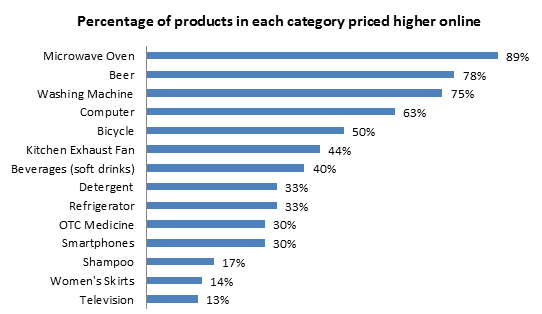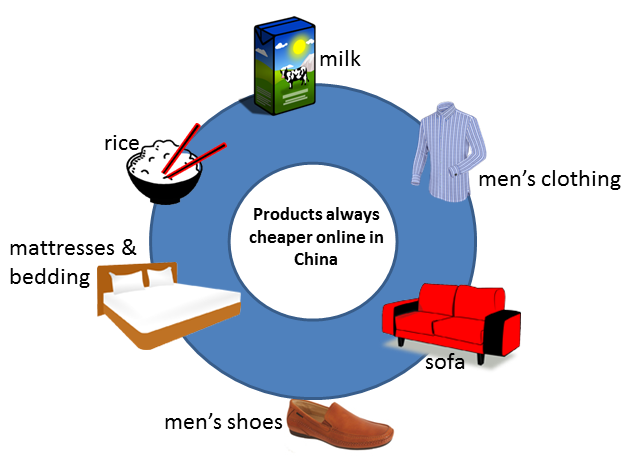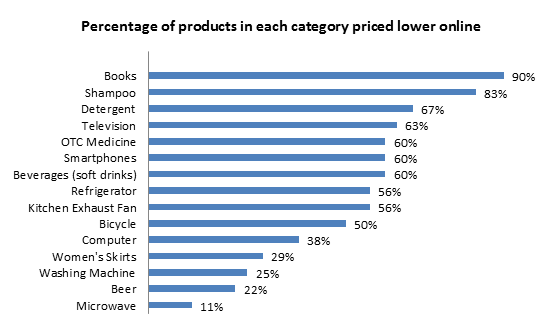Online vs. Offline: Where Do Chinese Consumers Really Win?

Slick images of celebrities fill billboards across China right now, urging consumers to visit the major e-commerce platforms like Alibaba's T-mall, jd.com, and yihaodian on November 11 to snap up the one-day flash bargains that will be on offer for Single's Day. This Chinese shopping holiday, created by e-commerce giant Alibaba in 2009, has become a multi-billion dollar consumption frenzy that now dwarfs Black Friday and Cyber Monday in the US. Alibaba posted record-breaking sales of $9.3 billion on November 11, 2014, with the highest sales volume reportedly for gadget and home appliance purchases made through the official Xiaomi, Huawei and Haier shops on Alibaba's T-mall platform.
As these numbers show, online shopping is increasingly popular in China. The China E-Commerce Research Center (CECRC) said that consumer e-commerce grew by almost 50% year-on-year to RMB 2.8 trillion ($450 billion) in 2014, and it projects rapid growth will continue this year as well.
But is online shopping always a bargain? A recent pricing survey by CEIBS Associate Professor of Marketing Yi Xiang shows that the average online prices for consumer goods in China are only 8% lower than their offline prices when there are no sales promotions. In fact, in some popular categories consumers will actually find much lower prices if they make their purchase at a traditional bricks-and-mortar retail outlet. Meanwhile in many other categories, prices are the same both online and offline.
Consumers may find Professor Xiang’s findings helpful when making up their Single’s Day shopping lists. They may explain why there was such a high volume of gadget and home appliance sales during last year’s Single’s Day. Typically many of these products are more expensive when purchased online. For example he found that 89% of microwave ovens, 75% of washing machines, 63% of computers, and 44% of kitchen exhaust fans are usually priced higher online. Therefore online sales promotions for these items would be appealing to shoppers who will feel as if they are getting a bargain.

There are, however, products that are always cheaper to buy online. Professor Xiang found this to be the case for air conditioners, beds, sofas, and men’s clothing. So it is unlikely there will be many Single’s Day bargains for items in these categories as their prices are already low online.

Single’s Day shoppers may also want to relax a bit if they are looking to buy books, over-the-counter medicines, refrigerators, televisions or smartphones, as Professor Xiang found that the majority of these goods are usually priced lower online anyway. So, again, less chance of prices going any lower on 11/11.

To develop his pricing survey, Professor Xiang followed the China Statistics Bureau’s Consumer Price Index (CPI) approach. China’s CPI has more than 200 types of consumer goods – he looked at those with a high sales volume that are readily available both online and offline. He compared the prices for products of the same brand/make/model/size sold online through platforms like T-mall, yihaodian and jd.com with their offline prices in retail outlets like Wal-mart, Carrefour, and Suning. His data set excluded promotions, and sales channels with a reputation for offering counterfeit goods.
“Some people think you always get a better deal online, but that’s not really the case,” he says. Professor Xiang’s academic curiosity on this price differential was sparked by a late night craving for sunflower seeds. “I bought a new brand of sunflower seeds one night, from Family Mart, and I really enjoyed them. To avoid future midnight shopping trips I decided to order a couple boxes online to keep at home. Immediately after I placed the order and paid, I thought about the price. They were RMB 11.8 online, but only RMB 11.3 at Family Mart,” he says. Though he admits that this research hasn’t caused him to significantly change his shopping habits, he has made one slight adjustment. “I don’t buy sunflower seeds online anymore,” he says with a smile.













